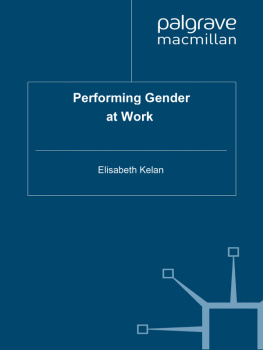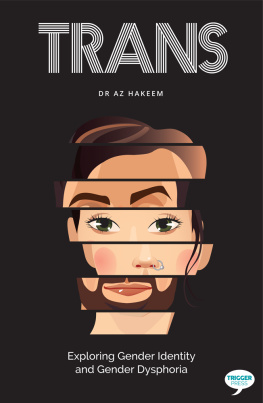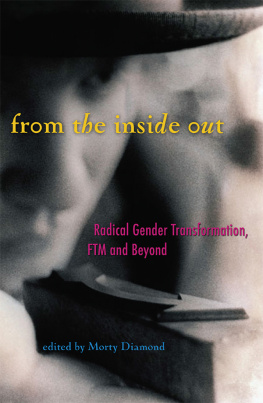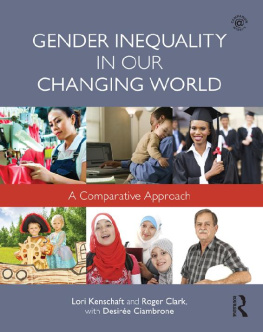Performing Gender at Work
Ismail Amla, Partner and Human Capital & Diversity Lead, Accenture
Elisabeth Kelan brings a fresh perspective to an age-old issue, which is impacting all businesses today. How in a world of changing demographics, employee expectations and business need do we leverage the potential of the full workforce so that diversity of gender provides distinctiveness and competitive advantage? Kelan provides some insight supported by robust empirical evidence. A great tool for professionals looking at developing a Human Capital Strategy that will stand the tests of the coming decade.
Silvia Gherardi, Professor for Sociology of Organizations, University of Trento
This passionate book takes a look at the rapidly changing relationship between gender and technology. It is a must read for those who want to learn more about what it means to perform gender and to be performed by gender at work.
Sylvia Ann Hewlett, President, Center for Work Life Policy
A strongly motivated, compelling piece of research. Elisabeth Kelan challenges us to think about the ways in which the evolving economy shapes new gender inequities. Her eye popping investigation into how gender progress lags as technology expands is a must read.
Susan Vinnicombe, OBE, Professor and Director of the International Centre for Women Leaders, Cranfield University
This book challenges the gendered nature of ICT work and is based on studies of two companies in Switzerland. Scholars of gender will welcome Elisabeth Kelans insightful reflections. The author should be congratulated on producing such a well written and engaging book.
Judy Wajcman, Professor of Sociology, London School of Economics
Technology, the economy and gender relations are at a critical juncture of transformation. This book provides a major and original contribution to grasping the mechanisms involved by treating gender as a performance. It is a compelling read for anyone interested in the gender relations of the digital economy.
Performing Gender at Work
Elisabeth Kelan
Lecturer in Work and Organisations
Department of Management, Kings College London


Elisabeth Kelan 2009
All rights reserved. No reproduction, copy or transmission of this publication may be made without written permission.
No portion of this publication may be reproduced, copied or transmitted save with written permission or in accordance with the provisions of the Copyright, Designs and Patents Act 1988, or under the terms of any licence permitting limited copying issued by the Copyright Licensing Agency, Saffron House, 6-10 Kirby Street, London EC1N 8TS.
Any person who does any unauthorized act in relation to this publication may be liable to criminal prosecution and civil claims for damages.
The author has asserted her right to be identified as the author of this work in accordance with the Copyright, Designs and Patents Act 1988.
First published 2009 by
PALGRAVE MACMILLAN
Palgrave Macmillan in the UK is an imprint of Macmillan Publishers Limited, registered in England, company number 785998, of Houndmills, Basingstoke, Hampshire RG21 6XS.
Palgrave Macmillan in the US is a division of St Martins Press LLC, 175 Fifth Avenue, New York, NY 10010.
Palgrave Macmillan is the global academic imprint of the above companies and has companies and representatives throughout the world.
Palgrave and Macmillan are registered trademarks in the United States, the United Kingdom, Europe and other countries.
ISBN-13: 9780230577817 hardback
ISBN-10: 0230577814 hardback
This book is printed on paper suitable for recycling and made from fully managed and sustained forest sources. Logging, pulping and manufacturing processes are expected to conform to the environmental regulations of the country of origin.
A catalogue record for this book is available from the British Library.
A catalog record for this book is available from the Library of Congress.
10 9 8 7 6 5 4 3 2 1
18 17 16 15 14 13 12 11 10 09
Printed and bound in Great Britain by
CPI Antony Rowe, Chippenham and Eastbourne
To my grandfathers, Dr. med. Fahri Keecio lu and
lu and
Herbert Wehrmann, who maintained a keen interest in
new technologies throughout their lives
Acknowledgements
Many people have helped me to research this book. First of all, I thank Rosalind Gill for her continuing guidance and support over the past years and for encouraging me to think through the topics explored in this book. Judy Wajcman sparked my interest in gender and technology, and without her I would not have written a book on this topic. Margaret Wetherell and Flis Henwood provided valuable feedback on my work for which I am grateful. I thank Andrea Maihofer, Julia Nentwich, Therese Steffen, the participants in the Graduierten Kollegien Gender Studies in Switzerland, the research students and staff of the Gender Institute at the London School of Economics and Political Science and various seminar and conference participants for the inspiring conversations on my research. I thank Barbara Schultes-Glatz for helping me with the interview transcription and Hazel Johnstone and Ralph Kinnear for their help with editing the manuscript. Thanks also to Virginia Thorp from Palgrave, who was fantastic in guiding me through publishing my first book.
I wrote the book while working as a senior research fellow in the Lehman Brothers Centre for Women in Business at the London Business School. I am very grateful to have been part of this wonderful team. I learnt so much about doing and communicating research from Lynda Gratton, Lamia Walker, Enid Silverstone, Katharine Buckley, Ellen Miller, Rachel Dunkley Jones, Alice Mah and David Lane. Thanks to all of you for your professional support and friendship.
This research would not have been possible without the financial support of the following institutions: the Graduierten Kolleg Knowledge Society and Gender Relations at the University of Zurich, the German Academic Exchange Service (DAAD), the Gender Caucus of the UN World Summit on the Information Society, the Sir Richard Stapley Educational Trust, a Metcalfe studentship and an LSE research studentship.
Parts of this book have previously been published in academic journals and edited books. I am indebted to Elsevier, Taylor & Francis, Wiley, Sage and the Idea Group for allowing me to re-use work published in their journals and books. This work includes:
Kelan, Elisabeth K. (2007), I Dont Know Why: Accounting for the Scarcity of Women in ICT Work, Womens Studies International Forum, 30:6, 499511.
Kelan, Elisabeth K. (2007), Tools and Toys: Communicating Gendered Positions towards Technology, Information, Communication & Society, 10:3, 357382.
Kelan, Elisabeth K. (2008), Emotions in a Rational Profession: The Gendering of Skills in ICT Work, Gender, Work & Organization, 15:1, 4971.
Kelan, Elisabeth K. (2008), Gender, Risk and Employment Insecurity: The Masculine Breadwinner Subtext, Human Relations, 61:9, 11711202.
Kelan, Elisabeth K. (2008), Self-Entrepreneurial Careers: Current Management Practices in Swiss ICT Work, in Dariusz Jemielniak and Jerzy Kociatkiewicz (eds.), Management Practices in High Tech Environments (pp. 283297) (Hershey, PA: Idea Group).
Kelan, Elisabeth K. (2009), Gender Fatigue: The Ideological Dilemma of Gender Neutrality and Discrimination in Organisations, Canadian Journal of Administrative Sciences










 lu and
lu and